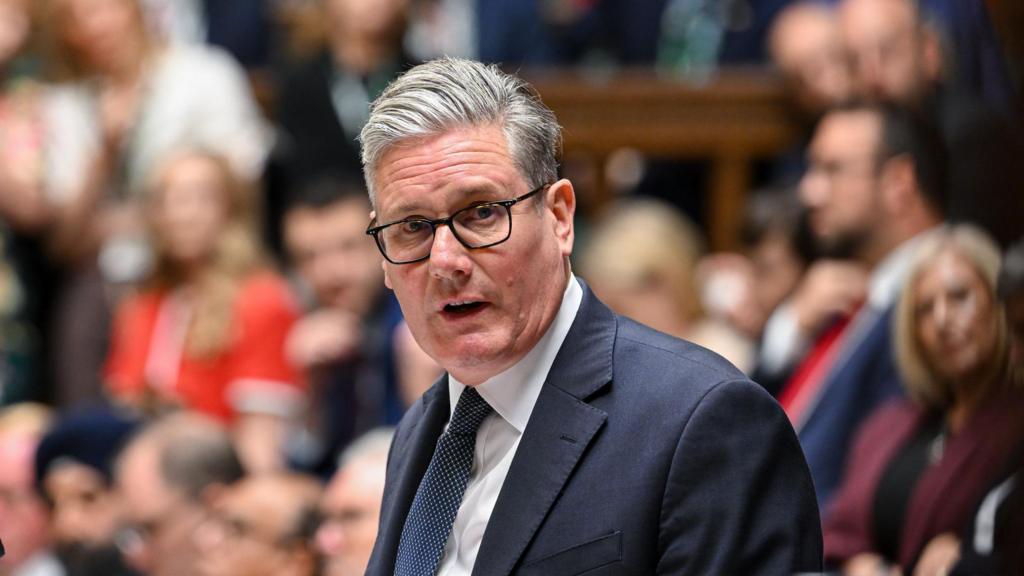Kemi Badenoch and Sir Keir Starmer have clashed over a cabinet minister’s assurance that individuals with “modest” incomes will be shielded from forthcoming tax increases.
Transport Secretary Heidi Alexander initially made the pledge during a Sunday interview, addressing potential tax adjustments in the upcoming Autumn Budget.
Subsequently, government ministers have faced scrutiny and ambiguity when pressed to define the parameters of this commitment.
During Prime Minister’s Questions, Tory leader Badenoch asserted that Sir Keir “doesn’t know” the answer to the question of who qualifies.
The Prime Minister defended the government’s economic stewardship, contrasting it with what he described as “stagnant” economic growth under the Conservatives over a 14-year period.
Labour’s election manifesto included a pledge to protect “working people” from tax hikes, an assurance that became a focal point leading up to last year’s Budget, as ministers struggled to articulate the specific beneficiaries.
On Sunday, Alexander further elaborated on the matter, stating in a Sky News interview that “people on modest incomes, working people” would be protected from tax increases in the upcoming budget.
During PMQs, Badenoch urged Sir Keir to “clear up the confusion,” noting that ministers “seem incapable of explaining who is in that category”.
In response, the Prime Minister stated that the government was “fixing the country” for “the sort of people that work hard but haven’t necessarily got the savings to buy themselves out of problems”.
He further stated: “That’s who we’re working for, and that’s why we put the national living wage up, that’s an extra £1,400.”
The government is widely anticipated to introduce tax increases in the Autumn Budget, following weaker-than-expected economic data and policy reversals on welfare cuts, which have complicated efforts to meet self-imposed spending targets.
Government ministers have consistently maintained that they cannot finalize the Budget in advance, while also vowing not to raise the most significant revenue-generating taxes available to the Treasury before the next general election.
These taxes encompass income tax rates, Value Added Tax (VAT), and corporation tax.
Labour has also pledged not to increase National Insurance contributions, a commitment that led to a dispute last autumn when the party announced a rise in employer contributions.
Consequently, ministers may face sustained scrutiny throughout the summer, as they are repeatedly asked to rule out potential tax increases in other areas.
Recent reports have suggested that ministers are considering extending the freeze on income tax thresholds beyond the 2028 date established by the previous government, potentially drawing more individuals into higher tax brackets as wages rise.
Furthermore, ministers are facing calls from some Labour backbenchers to explore additional taxes targeting wealth.
During PMQs, Badenoch accused the government of “considering taxing” pension contributions, though she did not elaborate on the specific details.
Labour ministers have previously offered various definitions of who would qualify for tax protection as a “working person”.
Ahead of last autumn’s Budget, the Prime Minister stated that this category includes those who “go out and earn their living” and cannot “write a cheque to get out of difficulties”.
He added that individuals with additional income from assets, such as shares or property, would not fall under his definition.
His spokesman later clarified that those with a “small amount of savings” could qualify under the Prime Minister’s definition, including individuals holding stocks and shares in a tax-free Individual Savings Account (ISA).
Sign up for our Politics Essential newsletter to keep up with the inner workings of Westminster and beyond.
Brian Leishman has lost the whip after repeatedly criticising Sir Keir Starmer’s government.
Details of thousands of Afghans who supported UK forces were mistakenly leaked under the last government.
Neil Duncan-Jordan, Brian Leishman, Chris Hinchliff and Rachael Maskell all voted against welfare reforms.
The US President will also meet First Minister John Swinney during the private trip to Scotland later this month.
The US president is expected to arrive at his Aberdeenshire golf resort later this month.

